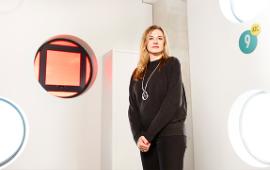Swinburne researcher says women have a natural advantage in the sciences

In Summary
This article originally featured in Swinburne’s Venture magazine
Multitasking is an asset to crafting a career in science, research psychologist Professor Susan Rossell says. Successful multitasking offers researchers the capacity to pursue “long-shot” projects while simultaneously following more mainstream paths of inquiry.
“I don’t think there’s any question that women are better multitaskers than men, so we can have slightly off -beat, innovative ideas,” Professor Rossell, the Director of Swinburne’s Centre for Mental Health, says. “I know many incredibly creative men in science, but I think women are a little more creative.
She adds, though, that a mix of male and female researchers enhances cohesion in the laboratory.
“Males can get very competitive with each other. Women who stay in the lab are competitive, too, but I think we are a lot more collegial.”
Professor Rossell is a neuropsychologist whose work mapping the brains of subjects with schizophrenia has her exploring what she calls “one of the great enigmas”. Through neuroimaging she has established that the voices often experienced by sufferers of schizophrenia generate the same brain activity as external sounds: in other words, they are not the imagined experience they were once thought to be.
As well as investigating genetic links to mental illness, Professor Rossell is pursuing a promising lead that suggests certain types of memory loss might be the “biomarker” that could predict the onset of schizophrenia.
This work is now possible with Swinburne’s imaging equipment, which includes a magnetic resonance-imaging scanner and a magnetoencephalography (MEG) unit, one of only two in Australia. The MRI offers a clear picture of the brain’s anatomy and its responses to stimuli, albeit with a time lag, while the MEG shows the brain’s electrical activity in real time.
Used in conjunction, they offer an accurate picture of the brain’s anatomy complemented by the overlay of its activity.
“That was the first 10 years of my research profile: ways of understanding the brain in action. Now we are using it more to assist us with developing our interventions for different treatment protocols,” Professor Rossell says.
She says her career has shown her that the measures of success in science — such as the frequency of publications and attendances at conferences — sometimes work against women, whose progression might be interrupted by starting a family. After that, resuming a career in research is problematic.
“I advise all my students to double train as clinicians, so that when it gets really hard as a researcher you have a back-up plan,” she says. “I advise my male students to do the same thing, but I really do emphasise it with my female students.”

